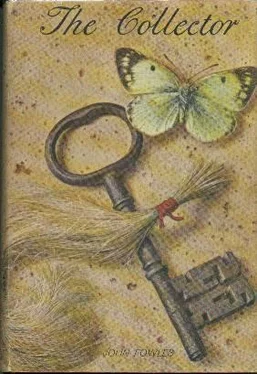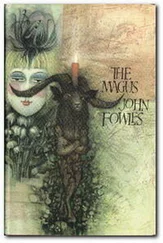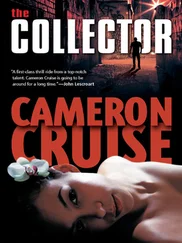They’re not even good people. They have weak moments. Sex moments and drink moments. Coward and money moments. They have holidays in the Ivory Tower. But a part of them is one with the band.
The Few.
November 9th
I’m vain. I’m not one of them. I want to be one of them, and that’s not the same thing.
Of course, Caliban is not typical of the New People. He’s hopelessly out of date (he will call the record-player, the “gramophone”). And there’s his lack of confidence. They’re not ashamed of themselves. I remember D saying they think they’re all equal to the best as soon as they have a telly and a car. But deep down Caliban’s one of them—there’s this hatred of the unusual, this wanting everybody to be the same. And the awful misuse of money. Why should people have money if they don’t know how to use it?
It sickens me every time I think of all the money Caliban has won; and of all the other people like him who win money.
So selfish, so evil.
G.P. said, that day, the honest poor are the moneyless vulgar rich. Poverty forces them to have good qualities and pride in other things besides money. Then when they have money they don’t know what to do with it. They forget all the old virtues, which weren’t real virtues anyway. They think the only virtue is to make more money and to spend. They can’t imagine that there are people to whom money is nothing. That the most beautiful things are quite independent of money.
I’m not being frank. I still want money. But I know that it’s wrong. I believe G.P.—I don’t have to believe him when he says it, I can see it’s true—he hardly worries about money at all. He has just enough to buy his materials, to live, to have a working holiday every year, to manage. And there’re a dozen others—Peter. Bill McDonald. Stefan. They don’t live in the world of money. If they have it they spend it. If they don’t they go without.
Persons like Caliban have no head for money. They’ve only got to have a little, like the New People, and they become beastly. All the horrid people who wouldn’t give me money when I was collecting. I could tell, I only had to look in their faces. Bourgeois people give because they’re embarrassed if you pester them. Intelligent people give or at least they look honestly at you and say no. They’re not ashamed not to give. But the New People are too mean to give and too small to admit it. Like the horrid man in Hampstead (he was one of them) who said, I’ll give you half a dollar if you can prove it doesn’t go into someone’s pocket. He thought he was being funny.
I turned my back on him, which was wrong, because my pride was less important than the children. So I put a half-crown in for him later.
But I still hate him.
With Caliban it’s as if somebody made him drink a whole bottle of whisky. He can’t take it. The only thing that kept him decent before was being poor. Being stuck to one place and one job.
It’s like putting a blind man in a fast car and telling him to drive where and how he likes.
A nice thing to end with. The Bach record came today, I’ve played it twice already. Caliban said it was nice, but he wasn’t “musical.” However, he sat with the right sort of expression on his face. I’m going to play the parts I like again. I’m going to lie in bed in the darkness and the music and think I’m with G.P. and he’s lying over there with his eyes shut and his pitted cheek and his Jew’s nose; as if he was on his own tomb. Only there’s nothing of death in him.
Even so. This evening Caliban was late coming down.
Where’ve you been, I snapped at him. He just looked surprised, said nothing. I said, you seem so late.
Ridiculous. I wanted him to come. I often want him to come. I’m as lonely as that.
November 10th
We had an argument this evening about his money. I said he ought to give most of it away. I tried to shame him into giving some away. But he won’t trust anything. That’s what’s really wrong with him. Like my man in Hampstead, he doesn’t trust people to collect money and use it for the purpose they say they will. He thinks everyone is corrupt, everyone tries to get money and keep it.
It’s no good my saying I know it’s used for the right purpose. He says, how do you know? And of course I can’t tell him. I can only say I feel sure—it must go where it’s needed. Then he smiles as if I’m too naïve to have any right on my side.
I accused him (not very bitterly) of not having sent the CND cheque. I challenged him to produce a receipt. He said the gift was anonymous, he hadn’t sent his address. It was on the tip of my tongue to say, I shall go and find out when I’m free. But I didn’t. Because it would be one more reason for him not to set me free. He was red, I’m sure he was lying, as he lied about the letter to D and M.
It’s not so much a lack of generosity—a real miserliness. I mean (forgetting the absurdity of the situation), he is generous to me. He spends hundreds of pounds on me. He’d kill me with kindness. With chocolates and cigarettes and food and flowers. I said I’d like some French perfume the other evening—it was just a whim, really, but this room smells of disinfectant and Airwick. I have enough baths, but I don’t feel clean. And I said I wished I could go and sniff the various scents to see which I liked best. He came in this morning with fourteen different bottles. He’d ransacked all the chemists’ shops. It’s mad. Forty pounds’ worth. It’s like living in the Arabian Nights. Being the favourite in the harem. But the one perfume you really want is freedom.
If I could put a starving child before him and give it food and let him watch it grow well, I know he’d give money. But everything beyond what he pays for and sees himself get is suspicious to him. He doesn’t believe in any other world but the one he lives in and sees. He’s the one in prison; in his own hateful narrow present world.
November 12th
The last night but one. I daren’t think about it, about not escaping. I’ve kept reminding him, recently. But now I feel I should have sprung it on him more or less suddenly. Today I decided that I would organize a little party tomorrow night. I shall say I feel differently towards him, that I want to be his friend and lameduck him in London.
It won’t be altogether a lie, I feel a responsibility towards him that I don’t really understand. I so often hate him, I think I ought to forever hate him. Yet I don’t always. My pity wins, and I do want to help him. I think of people I could introduce him to. He could go to Caroline’s psychiatrist friend. I’d be like Emma and arrange a marriage for him, and with happier results. Some little Harriet Smith, with whom he could be mousy and sane and happy.
I know I have to steel myself against not being freed. I tell myself it’s a chance in a hundred that he’ll keep his word.
But he must keep his word.
G.P.
I hadn’t seen him for two months, more than two months. Being in France and Spain and then at home. (I did try to see him twice, but he was away all September.) There was a postcard in answer to my letters. That was all.
I telephoned him and asked him if I could go round, the first evening I was back with Caroline. He said the next day, there were some people there that evening.
He seemed glad to see me. I was trying to look as if I hadn’t tried to look pretty. I had.
And I told him all about France and Spain and the Goyas and Albi and everything else. Piers. And he listened, he wouldn’t really say what he had been doing, but later he showed me some of the things he’d done in the Hebrides. And I felt ashamed. Because we’d none of us done much, we’d been too busy lying in the sun (I mean too lazy) and looking at great pictures to do much drawing or anything.
Читать дальше












